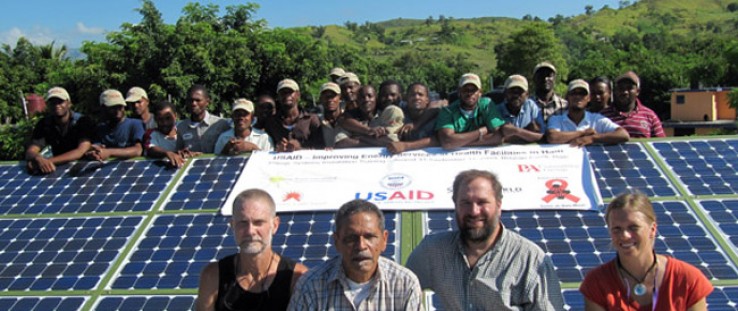 Instructors and participants after completion of a two-week training course in Boucan Carré, Haiti.
Jude Gaetan Juste
Instructors and participants after completion of a two-week training course in Boucan Carré, Haiti.
Jude Gaetan Juste
 Instructors and participants after completion of a two-week training course in Boucan Carré, Haiti.
Jude Gaetan Juste
Instructors and participants after completion of a two-week training course in Boucan Carré, Haiti.
Jude Gaetan Juste
Roméo Adhémar beamed as he copied down the electrical diagram for the new back-up energy system. The 30-year-old was part of a training workshop on back-up power systems for hospital technicians employed by the Haitian Ministry of Health, held this past March at the Haiti Tec vocational school campus in Port-au-Prince.
No access to the electric grid means that energy problems are rampant in the hospital where Adhémar works in Borgne on the remote north coast of Haiti.
Poorly maintained generators, diesel fuel shortages, and an unreliable power grid—when there is a power grid available—are some of the challenges for health facilities throughout the Caribbean nation. Yet energy is fundamental to any country’s health-care system, sustaining not only life-saving machinery, but also lighting, communications, laboratory analyses, diagnostic instruments, and vaccine refrigeration.
In Adhémar’s hospital, the battery system and solar panels recently installed by a USAID program help medical services continue uninterrupted, protect sensitive hospital equipment, and save expensive diesel fuel.
The program is about more than just providing back-up energy. Training sessions like the one Adhémar and his colleagues attended are all part of a push for greater sustainability in health-facility energy installations. Regular and ongoing maintenance and “data logging” in all medical installations in Haiti is a key goal of USAID’s Improving Health Facilities Infrastructure (IHFI) program. Logging data on these crucial machines not only provides an important maintenance record, but also brings technicians closer to the machines, increasing familiarity and accountability, thereby increasing the chances that these systems work.
A Matter of Life and Death
USAID and the U.S. Centers for Disease Control and Prevention (CDC), through IHFI, work in six developing-world countries to enhance energy services in health-care facilities such as those that support the President’s Emergency Plan for AIDS Relief, or PEPFAR, and in other activities that strengthen health sectors around the world.
In Guyana, for example, USAID, partnered with CDC, is launching a program to help the Ministry of Health electrify remote rural clinics with solar panels. In Mozambique and Zambia, IHFI has worked with PEPFAR partners to help design back-up energy systems for the central teaching hospitals in both countries’ capital cities, an important step in allowing the labs in these facilities to be accredited.
And in Haiti, IHFI supports energy systems that provide clean and reliable power to approximately 20 of the most important health facilities throughout the country. In the poorest country in the Western Hemisphere, the Agency is working to implement rigorous data-logging and maintenance protocols at hospitals and clinics in partnership with the Ministry of Health so that life-saving equipment is operable.
“Reliable power is often a matter of life and death at health facilities in developing countries,” commented Jeffrey Haeni, USAID IHFI program manager. “On a visit to the neo-natal ward at the hospital in Cap-Haïtien, in the north of Haiti, the doctor reported that three babies had died the previous week as a result of power outages. There was insufficient power to run the incubators and a suction machine, and poor lighting resulted in an IV being adjusted incorrectly.”
Reliable power is also critical to retaining staff. The doctor interviewed in Cap-Haïtien, who did not want to give his name, was so discouraged with the poor working conditions in the hospital that he said he was going to leave his post.
Building New Foundations for Health
On a warm afternoon in mid-February, Dr. Jean Gracia Coq, medical director at the
Justinien Hospital in Cap Haïtien had a worried look on his face. Several of the new computers installed by the CDC to analyze laboratory data and store patients’ electronic medical records were not only out of service, but beyond repair, fried by a voltage spike from the hospital’s diesel generator.
Grid power to his large regional hospital was only available for a few hours per day—and he never knew when—so the hospital depended on that generator to ensure that critical medical areas had access to electricity.
Now, in addition to a faulty generator and blown computers, the batteries that ensured clean power to the laboratory test instruments were no longer charging.
Alerted by a CDC representative, the local IHFI team flew a diesel engine mechanic up from Port-au-Prince, and temporary repairs got the generators humming and the batteries charging again.
But what Adhémar and his colleagues learned at the workshop could have prevented Dr. Coq’s generator problem, avoided the need to postpone surgeries, and saved the high costs of emergency generator repair.
“Through this program, USAID in Haiti is working to build awareness of the importance and the manner of maintaining energy systems for sustainability. It is something of a grass-roots process,” says Stephane Morisseau, a public health adviser at USAID/Haiti. “By responding to hospital directors and engaging with technicians, in addition to working with health ministry offices and local vocational technical training institutes, IHFI team members are attempting to develop and foster a culture of responsibility and the technical knowledge that will result in longer life and better performance of the energy infrastructure that is so fundamental to health facility operation.”







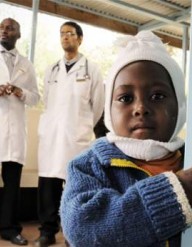

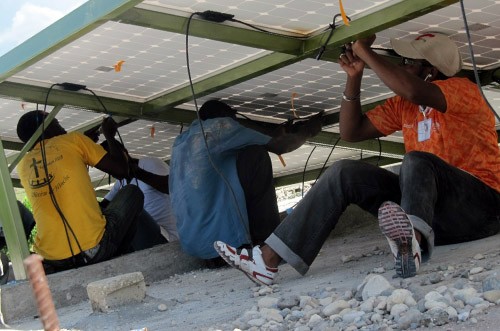
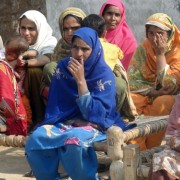

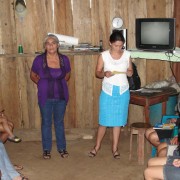
Comment
Make a general inquiry or suggest an improvement.